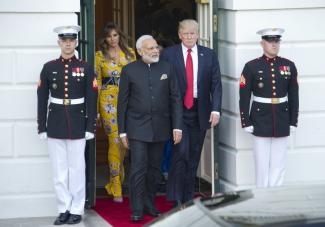Right-wing populism
Demonising others

Swami Adityanath is the new chief minister of Uttar Pradesh, India’s most populous state. He is a Hindu monk and belongs to the BJP, the Hindu-chauvinist party which is led by Prime Minister Narendra Modi. In the election campaign, Adityanath claimed that the previous state government’s policy on electric power distribution had given priority to Muslim villages. He did not provide any proof. In a TV interview after the election, he was confronted with facts that proved his claim wrong. His response was: “Stop quoting data.” What matters in his eyes, is Hindus’ sense of grievance, not whether such feelings are based on real disadvantages.
Disregard for expert knowledge is common among right-wing populists. Michael Gove, a prominent Brexit proponent, famously said before the EU referendum in Britain: “People in this country have had enough of experts.” Leaders like him call those who oppose them “anti-national”.
A nation consists of all its people, but populists like to consider only those who follow them the “real” people, denying legitimacy to all other groups. In this regard, US-President Donald Trump’s statement that he would only accept the election result if he won made perfect sense.
Right-wing populists are divisive. They thrive on demonising others and amplifying xenophobia. India’s BJP is known for anti-Islamic attitudes. Its leaders largely keep silent when Hindu fanatics perpetrate violence against Muslims. Several Muslims have been killed in recent months. The murderers claimed to be protecting cows and accused their victims of selling or merely eating beef.
It is striking that Trump similarly stays silent when Muslims – or people mistaken for Muslims – are attacked in his country. Just like the BJP, he has stoked anti-Islamic sentiments. Leaders of this kind prefer neglecting their constitutional duty of protecting minorities to offending any potential supporters. When serving as chief minister of Gujarat in 2002, Modi failed to stop communal riots in which at least 1000 people were killed; the vast majority was Muslims. Rodrigo Duterte, the president of the Philippines goes beyond closing his eyes to murder – he explicitly encourages the security forces and death squads to kill those presumed to be drug dealers or addicts. Acting tough serves the strongman image, but acknowledging crimes in one’s own camp would weaken one’s own camp.
Right-wing populists not only maximise the distance between majority and minority communities, they also appropriate discourse on social justice. They do not, however, make an objective distinction between the oppressors and oppressed. In India, that would be landlords and business owners, who mostly belong to the dominant castes, on the one hand, and exploited people, many of whom are Dalits or Adivasis, on the other hand. Instead of tackling the roots of inequality, populists feed resentment and promote distorted “us versus them” politics. They pretend that “strong” leadership will deliver justice and harmony, restoring things to a supposed natural order.
No such natural order exists – and it never did. Populists promise to deliver the undeliverable. No, Brexit will never free up a weekly 350 million pounds for the National Health Service. No, Mexico will never pay for a border wall. No, India is not even close to creating 20 million new jobs every year.
Democracy is fundamentally about public participation and all major interests being represented in legislative bodies. As early as the 1950s, B.R. Ambedkar, the architect of India’s constitution, warned that democracy in India was “only a top dressing on an Indian soil, which is essentially undemocratic”. He also said that “cult and hero worship” could destroy it. Committed patriots do well to defend their nation’s institutions against the onslaught of self-proclaimed “heroes”.
Manoj K. Jha is a professor of social work at the University of Delhi.
manojmeeta@gmail.com







